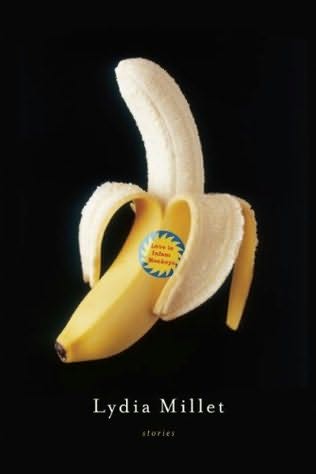
Lyida Millet is one of those astonishingly talented writers whose work should be better known. Her 2005 novel, Oh Pure and Radiant Heart, is one of my favorite books of the 21st century. It should have won an award; why didn't it win an award? I don't read much contemporary fiction. Some of it is good - but often not good enough. If I'm going to read substandard fiction, I'd rather read books of a different time period (they're usually better-written). But Millet's work is SUPER-standard (OVER the top): she's original, witty, and more politically astute than any American writer today.

Her novel, Oh Pure and Radiant Heart, is a lyrical, darkly comic, political fantasy in which nuclear scientists attempt to make reparation for the atom bomb. Ann, a gentle librarian, awakes from a disturbing dream of Robert Oppenheimer kneeling in the New Mexico desert and witnessing the mushroom cloud. And then Oppenheimer comes back to life, with the two other scientists credited with the invention of the atom bomb, Leo Szilard and Enrico Fermi - as a result of the dream, or of witnessing the horror of the bomb. They learn the consequences of history and make a pilgrimage to demand nuclear disarmament. A cult forms to follow these penitent men in a fleet of RVs.
Loved the book! So I was expecting great things of Love in Infant Monkeys, her new collection of short stories.
These are Millet at her darkest and wackiest, in minimalist mode - and still political - a collection of edgy short stories linked by the presence of celebrities and animals. The style is much more truncated than that of her novels, and the reader’s attention is mostly on the black humor and irony. The characters in the stories include Madonna, Jimmy Carter, Thomas Edison, and David Hasselhoff’s dogwalker. Animal rights and animal abuse are a common theme and subtext - very hard to read.
In “Sexing the Pheasant,” Madonna shoots a bird and then meditates on what it means to be a pop star, egotistically congratulating herself on her superiority as she waits for Guy to stop his “frat boy” drinking and come and kill the pheasant. “She should step on its little head and crunch it. But her boots were Prada.”
Her narcissism is extreme.
“She was chosen by God. That was what so many people seemed to completely overlook. What else explained her meteoric rise to stardom?...For twenty years now she had basically been a megastar. Try the most famous person in the world, basically. They said her name in the same breath with Elvis and Marilyn.”
Ironic. Look what happened to them.
Actually, I like Madonna.
In “Love in Infant Monkeys,” the title story, the egotistical, cold scientist, Harry Harlow, tortures monkeys to prove that children need love. This is so ghastly to read I almost couldn’t finish it. He deprived them of their mothers and isolated them in boxes.
“Put it in a bare box, observe it. Anxiety first, shown in trembling and shaking; then come the screams...Make careful notations.”
He sees how the monkeys react to wire mannequins, mannequins in terry cloth, total isolation. He has no emotions. He has two families of children he never sees. His current wife is dying of cancer. He is a functioning alcoholic and he despises mothers: particularly a maternal woman at a party who is concerned about his sick wife. And then he has nightmares of facing the mother monkeys.
In "JImmy Carter's Rabbit," Jimmy Carter faces a giant rabbit while fishing. It lunges at him through the water. His boyhood friend, who tortured animals, has a problem with this absurdity. And so did the press, who published a ridiculous photo of him. But Carter is drinking with his boyhood friend for a different reason. And through the friend's eyes, we see a Carter that the friend doesn't see.
In " Thomas Edison and Vasil Golakov," Edison becomes obsessed with a film of electrocuting an elephant.
These stories are not for everybody - they’re very serious and ironic, the humor is hard, the cruelty is emphasized. I might as well admit I’m not a fan of short stories. Oddly, I found it harder to read about these animals than I did about the Atom Bomb. These are so pared-down that the lyricism is gone. They are solid short stories - but I much prefer her novels. How the Dead Dream is also very good. Her books are published by Soft Skull Press.
No comments:
Post a Comment